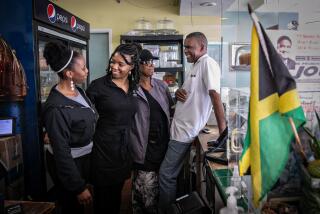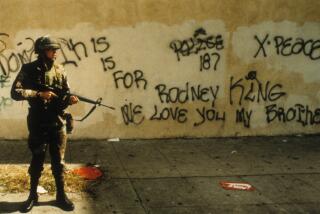RELIGION / JOHN DART : Clerics Try to Channel Outrage
- Share via
During a candlelight vigil at Cal State Northridge, which had just been officially closed on the first night of the citywide curfew, the Rev. Dudley Chatman of Pacoima praised a racially mixed crowd of 250 students for expressing solidarity in the face of pain.
“Please don’t forget this night,” Chatman urged.
Black, white and Latino students took turns denouncing the jury decision in the Rodney G. King beating case Thursday night. But they also cheered Tyrone Dorsey, a Watts-raised football player who said, “We’ve got to stick together,” and they lustily booed another student who shouted for people to join him in the defiant looting.
Chatman told the students that television cameras following the rioting in Los Angeles seldom illustrate the intentions of most people who want justice but abhor violence.
“You give me hope. . . . You are the brainpower of the next generation,” said Chatman, pastor of the predominantly black Greater Community Missionary Baptist Church.
Chatman’s participation in the rally--despite the imposition of a curfew--was typical of the efforts of religious leaders to encourage restraint and to channel support for constructive reform even as they decry the jury’s acquittal of four white officers charged with beating King.
Sister Carmel Somers, lead organizer of Valley Organized in Community Efforts, or VOICE, said that the group believes the investigation by federal authorities on whether King’s civil rights were violated must be pursued.
“People are in shock,” Somers said.
Somers also said she hoped that the violence of recent days would give new impetus to a proposed multimillion-dollar “Hope for Youth” campaign announced by Los Angeles religious leaders last month as a response to gang violence.
Officials of the United Methodist Church released a statement Friday that will be read Sunday at its churches in Southern California.
Written by the Rev. Donald Locher of Chatsworth, the statement called churches to prayerful reflection on “the systemic racism of which we are a part” and to begin dialogues with police about the equitable treatment of all people.
Reflecting the sentiments in a brief statement from Los Angeles Methodist Bishop Jack M. Tuell, who was out of town when the violence erupted, Locher and other district superintendents who drafted the message declared:
“It is a proper time for indignation. In a just society, those who are not victims must be as indignant as those who are.”
The statement recalled that when the dramatic videotape of the King beating was repeatedly televised, “the outrage of the community was tempered and peaceful in the hope that our treasured American judicial process would surely rectify the injustice. Many people now find that sense of hope betrayed.
“May we deplore not only the tragedy unleashed but the violence of exclusion and repression which has unleashed it.”
Likewise, the Rev. Davida Foy Crabtree, Southern California conference minister of United Church of Christ, described the current street violence as “the mirror image of decades of official violence masquerading as police protection.”
Episcopal Bishop Frederick H. Borsch of Los Angeles Friday lamented the losses suffered by residents in looted and burned areas.
“They worry as they think of the shortage of shops and stores and facilities which they will experience for years to come.”
In an irony tied to the Rodney King verdicts and subsequent rioting, a black minister from predominantly white Simi Valley is bearing a peace message to troubled spots in the San Fernando Valley.
The Rev. Curry McKinney is pastor of True Spirit Community Church, a nondenominational congregation that averages nearly 50 churchgoers on Sunday and is one of four black churches in Simi Valley.
Watching as the acquittals were announced on television, McKinney said he was “highly astonished” that no officer was found guilty on any count.
Yet, in his new role as president of a black ministerial alliance based in San Fernando, McKinney and his clergy colleagues decided early that their role should be to counsel calm in community meetings and on the streets.
“You can’t fight an injustice through violence,” McKinney said after a meeting at a Pacoima church on the first night of violence. He and other ministers urged people to seek remedies through increased voter registration and political reform.
“You can’t change a decision; you’ve got to move on despite the decision,” said McKinney, who is also a teacher at Los Angeles Trade-Technical College.
McKinney said that the San Fernando Valley Ministerial Alliance will meet this morning at Mt. Gilead Baptist Church in Pacoima to discuss further ways to deal with the unrest.
More to Read
Sign up for Essential California
The most important California stories and recommendations in your inbox every morning.
You may occasionally receive promotional content from the Los Angeles Times.













